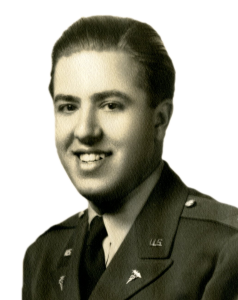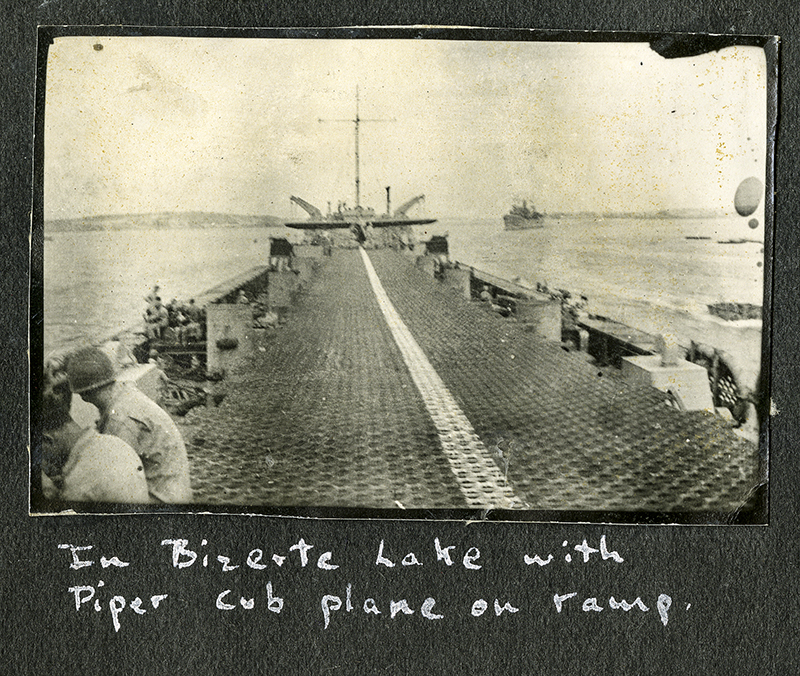You are here: Home / Bizerte, Tunisia June 26 – August 5, 1943
Bizerte, Tunisia
June 26 – August 5, 1943
We had several air-raid alarms, generally one or even two a night, and some during the daytime, but nothing happened until the early morning of the July 6th. “General-Quarters” sounded around 4 A.M. and it wasn’t long before all hell broke loose. We were in at the dock, had a nice white line down the runway and made a very nice target. On top of that, the ship next to us was loaded with ammunition on her top deck and considerable gasoline below. A nice situation. We could see the planes in the spotlights and all the guns poured out the lead at them. We later heard that there were some 50 planes. When I heard a bomb come whistling down I ducked back inside, as did the other Army Officers who were aboard. That whistle was no pleasant sound. All the guns on our ship were cutting loose and it really jarred us plenty. There was such a din outside that if anyone were trying to think, he couldn’t have even heard himself think.
Soon, Mr. Mitchell (one of the Sea-Bee officers, who had been in the Coast Guard in San Diego and who was also a Construction Engineer) came running in saying that he had a wounded boy with him and that something had exploded up by the forward guns. I looked at the soldier he had brought back to the ward room, saw several shrapnel wounds in the back of his leg and then went off forward, amid all the din of the firing, to see what had happened up front.
They already had one of the fellows down in the port troop compartment, and it didn’t take more than a glimpse to see that he was finished. He had a wound over the left occipital region, had a wound on his face, near the nose, and also one by his neck. He breathed his last as I reached him.
Then Cisco was brought in with a deep gash in his right groin. One of the boys had slapped a handkerchief above the wound as a tourniquet and the bleeding was thus controlled O.K. When the tourniquet was removed there was very little oozing, so we gave him some morphine sulfate and put a large bandage over the wound after the magic powder.
Then, I was called to the other side where there was another fellow who had been hit. I found him with a big gash that took away most of his left ear and a good chunk out of his occipital and temporal bone, exposing the occipital lobe to view. He also had a penetrating wound in his right upper abdomen. He was breathing only spasmodically, about one per 20 seconds. I gave him some caffeine and then tried to get into his heart with some 1:1000 adrenalin. The needle, however, was woefully lacking in length and consequently could only give the adrenalin in the tissues. The caffeine worked temporarily, as it stimulated his respirations for a few minutes, but then he relapsed again and soon was finished.
Then some of the smaller wounds started coming in, the firing having ceased as I remember, though, I’m not really sure what time the firing stopped. Lt. Jr. Mockbee (the executive officer, an old-time Navy man with 23 years in the Navy behind him) had a crease along the left side of his neck — a close call, and we were so busy with others, that it wasn’t until things were all over that we got around to him. He also had a big tear in the back of his field jacket, and he later remembered that he had been knocked to the deck and must have hit his shoulder at that time.
Just what landed up by that forward gun was never really figured out. There were shrapnel holes through the ammunition box there, and there were a couple of 20mm shells and also some Italian shells, but whether it was American or enemy shells that landed and caused the damage was never decided.
Lt. Beddoe quickly got the tank-deck cleared enough so that a vehicle could transport the injured to the hospital, and he himself took the boys to the 56th.
It was later found out that at least four planes had been shot down here and it is the consensus of opinion that our three-incher brought down one right in the harbor behind us. It was the only gun shooting at the time that the plane faltered and started down, and the boys were pretty proud of that. Some of the enemy pilots were later on picked up out in the outer harbor.
Apparently our ship suffered the worst damage to personnel, though some of the others had wounds of various kinds also. Apparently numerous bombs had been dropped, one right behind the hangar where the boys had been sleeping when they were here — but this one turned out to be a dud. Others were dropped near various dumps, one exploding in the center of a ration dump but ignited only one pile of food.
I went up to the 56th later in the morning and the boys there, Craven and Hurd, said that they had plenty of planes over them, but only some shrapnel landed near them. They were having plenty of business that morning – some 75 casualties from 4 A.M. to 11 A.M., five in all dead that were brought to them.
.


